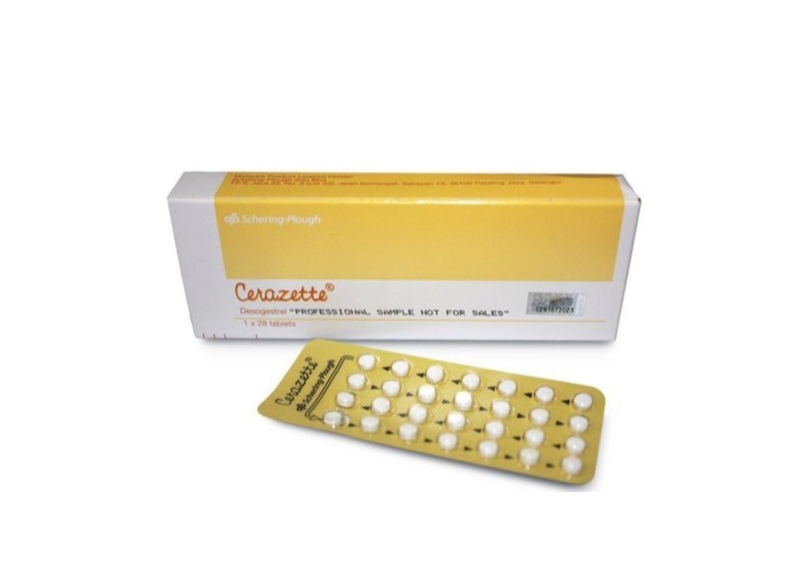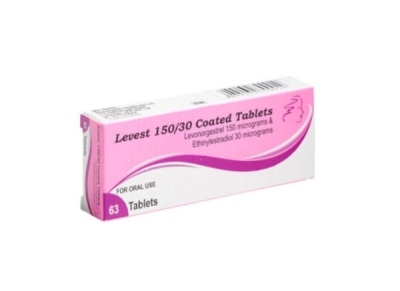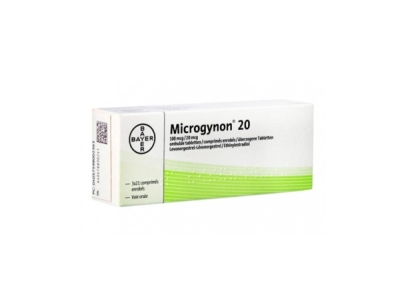How to Order ? Simple.
-

1.
Select Treatment
Choose from our treatment options or speak to the in-store pharmacist for advice
-

2.
Complete Medical Questionnaire
Complete our free online medical consultation to be reviewed by our Clinical Team
-

3.
Collect Medication from Local Pharmacy
We will notify you when your medication is ready for collection
Advice for Contraception
The oral contraceptive pill is a widely used method of contraception, taken by millions of women across the UK. There are several types of pill available, and what you use may depend on your preference or other medical considerations. There are two main types of oral contraception: combined hormonal pills and the progesterone only pill.
The combined oral contraceptive pill is the most commonly taken pill and includes well-known brands such as Mirogynon, Levest and Rigevidon. The combined pill is taken daily, and if taken correctly is over 99% effective in preventing unwanted pregnancy.
The combined pill contains small amounts of oestrogen and progestogen which work in 3 different ways to prevent pregnancy. They prevent the release of an egg from the ovaries, they make the fluid in your cervix thicker (to make it more difficult for sperm to enter the womb), and they prevent the lining of your womb from thickening enough for an egg to grow in it.
The additional benefits of the combined hormonal pill is helping to regulate periods that have been irregular, make it lighter and less painful. Some combined pills also help to reduce acne. Others reduce your risk of cancer of the ovaries, womb and colon. However, there are a number of factors that may prevent its use as a form of contraception. These include if you have just given birth, if you are older than 35 and smoke, or if you have poorly controlled high blood pressure. The combined pill does carry increased risks of blood clots and can cause some side effects such as mood swings, weight gain and skin problems.
The progestogen-only pill, also known as the 'mini-pill', only contains a progestogen and does not have an oestrogen ingredient. They work by thickening the cervical mucus which stops sperm reaching an egg. Some progestogen-only pills contain Desogestrel, which also prevents the release of an egg from the ovary. The above two effects make Cerazette and the other Desogestrel containing mini-pill’s 99% effective at preventing pregnancy if taken properly.
Examples of mini pills are Cerazette and its generic version, Desogestrel. They all contain the active ingredient Desogestrel 75mg which is a type of synthetic progestogen. With the mini pill, you take a pill every day and start a new pack straight away. There is no break between packs.
One of the core advantages of the mini pill is that it's safe for women who have certain health conditions that the combined pill would not be suitable for. The mini pill is also less likely to interfere with breastfeeding than the combined pill, and can more markedly reduce risk of endometrial cancer. It can be used at any age over 16, and is perfect for women that can’t take oestrogen for whatever reason. In summary, there is a consensus amongst the healthcare professionals that the contraceptive pill is safe for the majority of women to use for birth control with few or no side effects. Some of the benefits of taking the pill are:
- Easy and convenient contraceptive method.
- Highly effective in preventing pregnancy.
- Lighter periods and also less cramping, bloating, and irritability that are often associated with normal menstruation.
- Does not interfere with sexual intercourse.
- May provide some protection from pelvic inflammatory disease which, if left untreated, can lead to infertility.
- Clearing up hormonal acne
At Pharmacinta, we have a wide range of combined and progesterone only pills, which are available in different brands to ensure you stick to the same brand that works for you. If you do not find the brand you are looking for here, please state the exact brand you prefer in the medical assessment form. We will try to supply your preferred brand if our clinicians decide it is clinical safe and appropriate for you.
There are two main types of contraceptive pill, the combined pill and the mini pill. Both of these types of pills are over 99% effective in preventing pregnancy, but they differ in ingredients and who they’re suitable for.
The combined contraceptive pill contains two synthetic versions of the hormones progestogen and oestrogen, which are produced naturally by your body. Most combined pills contain the same amount of hormones in each pill, delivering a consistent dose of progesterone and oestrogen every day. These are called monophasic pills.
The mini pill (progesterone only-pill) does not contain oestrogen and only contains the hormone progesterone. And because of this, we usually recommend it to women who can’t have oestrogen for any health or personal reasons.
How to take Monophasic 21-day Combined Contraceptive Pills:
- Start your packet of pills with the first pill marked with the correct day of the week.
- Continue taking one pill at the same time each day, working your way around the pack until it is finished.
- You should then have a 7-day break when you will have your period.
- You should then start your new pack of pills on the 8th day (this will be the same day that you started your last new pack).
How to take Progestogen-only Contraceptive Pills:
- Start your packet of pills with the first pill at a convenient time of day.
- Continue taking one pill at the same time each day within a 3-hour window (12 hours for Cerazette), working your way around the pack until it is finished after 28 days.
- Your pill may affect your period; it can stop, become lighter or irregular.
- You should start your new pack of pills the day after taking the last pill of the previous pack.
At Pharmacinta, we have a wide range of combined and progesterone only pills, which are available in different brands to ensure you stick to the same brand that works for you. If you do not find the brand you are looking for here, please state the exact brand you prefer in the medical assessment form. We will try to supply your preferred brand if our clinicians decide it is clinical safe and appropriate for you.
There are many different types of contraceptive pills and methods available although not all methods are suitable for some people. Your GP can talk about which contraceptive method would be right for you based on your current medicines and medical history.
Some alternative methods of contraception are:
Non-medicinal contraceptive
Female Condoms - the female condom is a lubricated "sheath" you insert into your vagina before having sex. It works by blocking sperm from reaching the cervix. When used correctly, it's up to 95% effective in preventing pregnancy.
Male Condoms - The male condom is a covering worn over the penis during sex to stop sperm from getting inside the vagina and fertilizing an egg. It's an affordable and effective method for preventing STIs and pregnancy. When used correctly, condoms are up to 98% effective.
Diaphragm - The contraceptive diaphragm is a form of birth control that doesn't contain any hormones. It is a soft latex-free dome with a flexible rim made from silicone that's inserted into the vagina to form a barrier that stops sperm from reaching the cervix to prevent pregnancy.
Cervical Cap - The cervical cap is a dome-shaped cup made of silicone you place inside your vagina with its rim fitted around the base of your cervix. This forms a barrier that stops sperm from reaching your uterus. However, you should always use it in combination with spermicide for it to be fully effective. When used correctly, it's up to 96% effective in preventing pregnancy.
Withdrawal Method - This is an unreliable method of contraception, where the man will remove (pull out) his penis from the vagina before he ejaculates. Doing this is risky, and can still cause pregnancy, as some sperm may be released before the man ejaculates. The withdrawal method does not protect you against STIs.
Medicinal contraceptive
There are many different forms of contraceptives each with their own advantages and disadvantages.
Hormonal Implant - A hormonal implant is a small tube placed under your upper arm's skin. It releases a hormone called progesterone to stop you getting pregnant. The implant is up to 99% in preventing pregnancy and is effective for 3 years.
Intrauterine device (IUD or copper coil) - An intra-uterine device is a type of birth control that's inserted through the vagina and cervix into the uterus to prevent pregnancy. The coil is up to 99% effective in preventing pregnancy and lasts for as long as it's in place.
Hormonal Coil (IUS) - Like the copper coil, but the IUS releases hormones which prevent you getting pregnant, and can also make your periods less painful, lighter, and shorter.
Depo-Provera Hormonal Injection - The hormonal injection is an injection of hormones you receive 8 or 13 weeks (depending on which type) to protect you from pregnancy. During this time, you are up to 99% protected against pregnancy.
Hormone Patch - The hormone patch is a small square patch worn on the skin. It contains similar hormones to those used in contraceptive pills, except you absorb them through your skin. When used correctly, the hormonal patch is up to 99% effective in preventing pregnancy.
Vaginal Hormonal Ring - The vaginal hormonal ring is a small ring that's inserted into your vagina. It contains the hormones oestrogen and progestogen, which are the same type of hormones used in contraceptive pills. When used correctly, the vaginal hormonal ring is between 99% effective in preventing pregnancy.
Frequently Asked Questions
Certain contraceptives have high oestrogen content, which can affect body mass. Certain combined contraceptives have also been shown to cause an increase in hunger.
Some of the most common side effects include mood swings, headaches, nausea, and breast tenderness.
The combined oral contraceptive can help to make periods lighter, less painful and more regular. When taken correctly the combined pill is more than 99% effective at preventing pregnancy. It can also help reduce the risk of womb and ovarian cancer.
The combined oral contraceptive can cause side effects including breast pain, spotting, and nausea. Other side effects such as headaches and mood swings are also common.
One advantage of the progestogen-only pill is that it has a lower likelihood of side effects because it does not contain oestrogen. It can also be used by women who are unable to take oestrogen. Women who are breastfeeding can take the progestogen-only pill at the same time.
The mini pill has to be taken at the same time every day. If you are more than 3 hours late (or 12 hours for the desogestrel pill), it may not be effective. It may cause periods to be irregular, they may stop altogether or get more frequent.
Some pills, if taken correctly, will provide protection immediately, while others take time to provide contraceptive cover.
Although you will be covered against pregnancy with the pill, it is always advised to use a condom. This is to reduce the risk of sexually transmitted disease such as chlamydia and gonorrhoea. No contraceptive pill will protect against sexually transmitted infections.
You should always take your pill around the same time each day to ensure maximum contraceptive cover. Different pills vary in the amount of time you can delay your dose. Always refer to your prescribed medication's patient information leaflet to find more detailed information relating to missed doses.
In the UK, you should speak to a GP or visit a sexual health clinic if you would like to get the contraceptive pill prescribed. This is free via the NHS.
If you have any history of blood clots, have ever had breast cancer, or are pregnant, or have any history of heart problems of any kind, you should not take contraceptive tablets.
Deciding on the correct birth control pill for you should be a joint decision between you and your doctor. There are many variables in both the contraceptive pills and your lifestyle that should be taken into account to choose the Pill that is most suited to you. Different contraceptive pills are suitable for different situations and all carry some form of risk.
The contraceptive pill is very effective, if taken correctly it has a 99% success rate, and it also doesn't reduce fertility in the long term. The combined contraceptive pill also has other added health benefits; it can reduce the incidence of acne, make periods lighter, pain free and reduce spotting. There is also evidence to suggest it can reduce the risk of cancer in the womb and ovaries.
Yes, you can become pregnant any time you have sex, even from your first time.
The withdrawal method is when the male removes the penis before ejaculation. Sperm can be present in lubricating fluids before ejaculation and in the heat of the moment it can be difficult to withdraw at the right time. This makes it an unreliable method of contraception.
There are implants, a progesterone only injection, contraceptive patches, Inter-Uterine Devices (IUD) and vaginal rings. These are all hormonal contraceptives; they release oestrogen/progesterone slowly to give continued contraceptive cover.
If used correctly, splitting of condoms is rare. Use a new condom every time you have sex, be careful when opening the packet as not to tear it with fingers or jewellery and make sure it is in date! Condoms still provide the best protection against STIís and using one is safer than not using them at all.
A woman is more fertile during ovulation, which occurs during the middle of her cycle. If your cycles are regular, you can determine when you will be most fertile and avoid sex at this time of the month. However cycles can vary in length and therefore it is not advisable to use the rhythm method as a form of contraception.
It is rare for the pill to affect your libido.
This will depend on the type of contraceptive pill you are taking, how many pills you have missed and what stage of your cycle you are currently in. It may not always be necessary to take emergency contraception. Read the 'Directions' tab for your pill above for further information on missed pills or contact your GP or pharmacist.
Some anti-epileptic medication, HIV medication and St Johnís Wort all decrease the effectiveness of the pill.
After taking the contraceptive pill, it takes roughly 3 hours for it to be absorbed fully into your system. If you suffer from vomiting or diarrhoea during the 3-hour period after taking your pill, it could mean that it has not been fully absorbed. Depending on the pill you are taking, you may need to follow the same instructions for missed tablets meaning you may not have effective contraceptive cover.
For combined contraceptive pills it does not matter at what time you take the pill, although you should aim to do this at a regular time every day, and missing one pill won't necessarily mean you are not covered. For progesterone only, they need to be taken at the same time each day or within 3 hours of that time (12 hours for Cerazette). Missing a tablet or not taking it at the right time may lead to bleeding or lack of contraceptive cover.
There used to be theories that taking breaks from the contraceptive pill and not taking it for long periods of time was beneficial. Medical evidence now seems to suggest that in women who don't smoke, do not have high blood pressure and are not overweight, it is perfectly safe to continue taking the contraceptive pill up until they are 45.
There are small risks attached to taking the contraceptive pill although these are thought to be outweighed by the benefits in younger women. For some women there will be a small increase in the risk of developing a blood clot, high blood pressure, and breast or cervical cancer. When the pill is stopped these risks generally slowly disappear.
The contraceptive pill does not reduce your fertility and you can conceive once you stop taking it. This is a lot quicker and easier than other forms of hormonal contraception. The injection, another effective form of contraception, can take up to a year to wear off and restore your fertility.
Bleeding between periods is a possible side effect of some of the contraceptive pills, especially the mini pill. Apart from discomfort and inconvenience, this is not usually a sign of something wrong and isn't harmful to your health. However, bleeding between periods is usually a temporary side effect, and typically gets better in the first few months as your body gets used to the pill.
There are lots of different contraceptive pills, so if you find that the pill that you are on isn't right for you, then there are plenty of other options to choose from. However, before switching to a different pill, you should talk with a doctor about which pill to switch to, and how to switch pills safely.
All contraceptive pills are equally effective, and are more than 99% effective in protecting you against pregnancy. However, things like missing a pill, and vomiting or having diarrhoea shortly after taking it can make it less effective.










